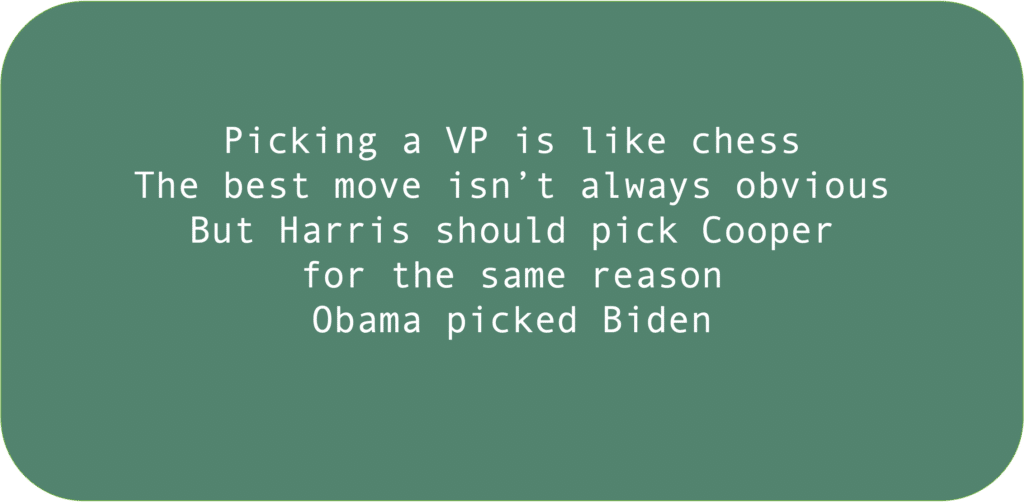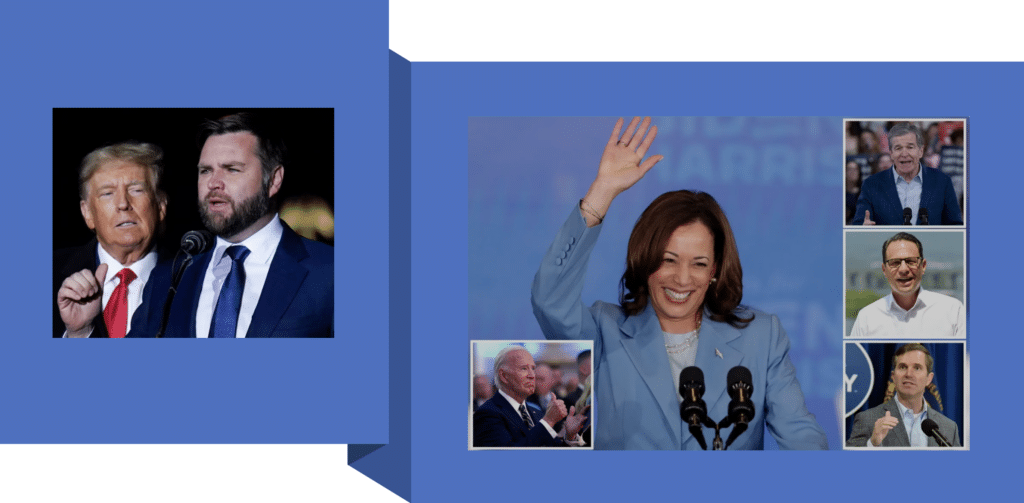
The attempted assassination of former president and 2024 Republican presidential nominee Donald Trump, coupled with Joe Biden’s sudden withdrawal from his reelection campaign, already made this a summer to remember. Now, Vice President Kamala Harris becoming the new Democratic nominee risks political sensory overload.
The VP countdown
President Biden led Democratic politicians, donors, and activists in endorsing Harris to replace him as the Party’s nominee. Some called for an open process. But Harris has already secured so many endorsements, including from would-be challengers, that she has effectively won the nomination by acclamation.
That’s why Harris is already searching for her VP running mate. The list of contenders reads like a who’s who of rising Democratic stars.
Any of them would present a Democratic ticket that makes the 1992 baby-boomer ticket of Bill Clinton and Al Gore look old-fashioned. Each candidate Harris is vetting has its own charm and tactical advantage, but the stakes are high — too high for a misstep.
Meet the VP contenders
The names on Harris’s desk read like a Democratic who’s-who of rising stars. But it might help to know that I picked the Biden-Harris 2020 ticket long before anyone even suggested it. Here are the top contenders for this ticket:
- Josh Shapiro: The Pennsylvania governor, praised for his quick action on infrastructure, notably rebuilding a collapsed section of I-95 in record time. His popularity is such that he could well deliver Harris this must-win state. Except that he’s a Jew; Harris is married to a Jew. And a virulent strain of antisemitism infects MAGA Republicans. So, if she picked Shapiro, you know they’d begin propagating conspiracies about a Jewish cabal running the country.
- Mark Kelly: The Arizona senator, former astronaut, and moderate voice who has built crucial coalitions. His military experience and moderate politics could be an asset. But he looks too much like Mr. Magoo.
- Gretchen Whitmer: Michigan’s governor, known for her focus on abortion rights and effective governance. An all-female ticket with Harris could be groundbreaking. But the revenge of the incels and the popularity of toxic masculinity make this too risky.
- Andy Beshear: Kentucky’s Democratic governor who won reelection in a red state. His bipartisan approach to governing makes his Bidenesque. But doubts abound that he could turn his state blue. Full disclosure: Beshear was my first pick. But he comes across on TV like a deer in the headlights, a la Dan Quayle. And that won’t do.
- JB Pritzker: Illinois’s billionaire governor, ready to finance the campaign and take Trump head-on. He brings financial muscle and a combative spirit. But he’s the Democratic version of Chris Christie, too big in size and personality to play second banana.
- Gavin Newsom: California’s governor, popular and ambitious. But two Californians on the ticket? This is unlikely due to constitutional hurdles and a lack of geographical balance.
Again, each of these candidates could bring something unique to the table. They have the experience, the drive, and the potential to energize the base and sway swing voters.

The case for Roy Cooper
Here’s the problem: A younger candidate like Shapiro, Kelly, or Whitmer would give them an eight-year head start on their own presidential ambitions. Those she doesn’t pick will have to wait not just eight years but possibly 16 or more before getting a legitimate shot at winning the Democratic nomination for president. That’s bound to dampen their support for her campaign, if not her presidency.
Enter Roy Cooper, the 67-year-old governor of North Carolina. Cooper’s steady hand and Southern charm make it seem like he’s channeling movie star Gary Cooper. Not to mention that he has Appalachian credentials that make J.D. Vance, Trump’s VP pick, look like an Appalachian carpetbagger.
After serving two terms as Harris’s VP, it’s unlikely that at 75, he’d throw his hat into the ring for the top job. Picking Cooper would avoid alienating the younger candidates, keeping them loyal and supportive as they prepare to contend in an open field for the Democratic presidential nomination in 2032. Full disclosure: I’m on record hailing Maryland Governor Wes Moore as a future president. 2032 would be the ideal year for him to run.
In short, Cooper is from a swing state (hello, electoral votes); he’s not gunning for the top job (no backstabbing here); and he leaves the field wide open for 2032 (let the games begin). Picking him is like hitting the snooze button on the ambitions of the younger candidates. It’s a masterclass in political chess.
That said, if I were a betting man, I’d bet on Kelly – for Arizona and his military bona fides.
Trump’s VP circus vs. Harris’s strategic search
Trump sucked up most media coverage of politics this summer with his trite, Apprentice-style search for his VP running mate. In stark contrast, Harris is mounting a far more discreet search.
Ironically, the inherent suspense is bound to make the media coverage Trump garnered look like an open mic night on public access TV.
In the grand scheme of things, Harris-Cooper 2024 seems not just a balanced ticket but a strategic move that sets the stage for the future of the Democratic Party. By selecting Cooper, Harris can unify the party, keep the younger contenders in line, and focus on winning the White House.
As the Democrats prepare for their nominating convention in Chicago next month, all eyes will be on Harris. And a Harris-Cooper ticket could be just what the Democrats need to secure victory and pave the way for a new generation of leaders in 2032.